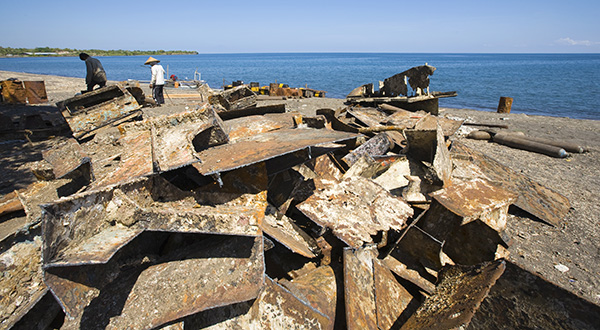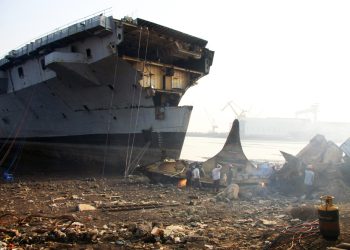The Danish Minister for Environment and Food has taken the first steps towards rules on scrapping ships thatensure that people and the environment are better protected globally when ships are broken up and recycled.
Worldwide, approximately 1,000 scrap merchant vessels are broken up every year so that valuable materials such as steel can be used again. By far the majority of these ships are sent to Asia, and they are broken up under unregulated conditions in countries such as India and Bangladesh. Often, these countries do not have the same focus on the environment and working conditions as Europe.
Esben Lunde Larsen, Danish Minister for Environment and Food is now preparing new regulations that will enable Denmark to accede to the Hong Kong Convention, which is a global agreement to ensure that ships are scrapped and recycled appropriately so that both people and the environment are protected against harmful chemicals.
“Scrap ships must not pollute Third World beaches. Ships are often hazardous waste and they must be broken up under appropriate conditions so that they do not pose a danger to human health and safety or the environment. Seeing the shipyards in Asia at which many scrap ships are broken up has made a strong impression on me. Therefore, adapting Danish regulations so that we can accede to the Hong Kong Convention has been an important priority, and it will help set global standards to ensure ships are broken up safely. This will send a strong signal to other countries, and the more countries that accede to the Convention, the quicker we can get it to enter into force,” said Esben Lunde Larsen.
According to the Danish Shipowners’ Association, an average of ten Danish-operated ships are sent to scrap every year. Only a small part of these is broken up in Denmark, the rest are broken up at shipyards in primarily India, China and Turkey.
The Hong Kong Convention was adopted by the UN International Maritime Organisation back in 2009. Parts of the Convention have already been adopted by the EU in the Ship Recycling Regulation, and Danish accession will make it more likely that more countries around the world will also accede to the Convention.
“I’m extremely pleased that the Minister is now making sure that Denmark will soon be able to accede to the Convention. Up to 70% of the world’s scrap ships are broken up in Third World countries, so global regulations are vital to ensure that ships are broken up appropriately. Therefore, we must urge more countries to follow in Denmark’s footsteps so that the Convention can finally enter into force. Until this happens, we’re encouraging all our shipping companies to comply with the upcoming requirements voluntarily,” said Anne H. Steffensen, Director General of the Danish Shipowners’ Association.
“The Danish Metalworkers’ Union and the Central Organisation of Industrial Employees are very pleased that the Danish government is now acceding to the Hong Kong Convention. We’ve been working for a number of years for full ratification of the Hong Kong Convention so that our foreign colleagues in India, Bangladesh and Pakistan, for example, can have reasonable working conditions when breaking up ships. The government’s proposal has taken us a good step forward,” said Claus Jensen, President of the Danish Metalworkers’ Union and the Central Organisation of Industrial Employees.
The new regulations have just been sent for consultation, and Denmark expects to be able to accede to the Convention in spring 2017.
Facts:
- With support from more than 60 countries, the UN International Maritime Organisation (IMO) adopted the Hong Kong Convention for Safe and Environmentally Sound Recycling of Ships in May 2009.
- When the Convention enters into force, it will obligate the countries acceding to it to have ships broken up at facilities complying with the requirements of the Convention and shipbreakers and recycling companies will only be able recycle ships in accordance with the Convention requirements.
- At least 15 countries must accede to the Convention before it can enter into force, and they must have a combined merchant fleet representing at least 40 percent of the gross tonnage of the global merchant fleet.
- Both the large flag states and the large ship-recycling states have to accede to the Convention to meet the conditions for entry into force. Only Norway, Congo, France and Belgium have acceded to the Convention so far.
- An amendment to the Danish Protection of the Marine Environment Act and the Environmental Protection Act now make it possible for Denmark to accede to the Hong Kong Convention.
- On average, ten Danish-operated ships are sent to scrap every year. Only a small part of these is broken up in Denmark, the rest are broken up at shipyards in primarily India, China and Turkey (source: Danish Shipowners’ Association).
- In 2015, 768 ships were sold for recycling globally. Of these, 469 (69 percent) were broken up on a beach in either Bangladesh, India or Pakistan (source: NGO Shipbreaking Platform 2015 annual report).






























































